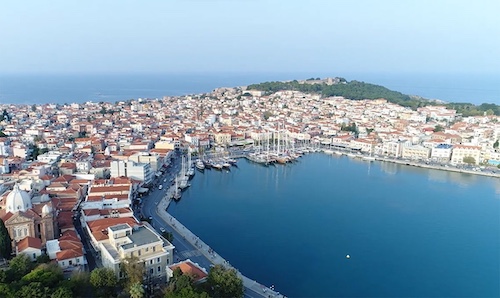(Photo: internet)
When you approach Mytilini by boat, you’re greeted by hills covered with white Mediterranean houses and an impressive castle. The city was founded in the eleventh century BC by the Penthilidae family, who claimed to be descendants of Orestes, son of the mythical Agamemnon. The first houses were built on a small island, separated from the mainland by a wide canal; under its elegant marble bridges, warships (triremes) sailed to the northern and southern harbor. It is said that Mytilini was then as beautiful as Rhodes and Ephesus. Later, the canal silted up and is now the shopping street Ermou.
For centuries Mytilini and Mythimna (Molyvos) fought for the power on Lesvos. Mytilini won, and around the seventh century, the city flourished and was enriched by philosophers, poets and musicians. Terpandros became the father of lyrical poetry (a form of poetry accompanied by music), and later the poets Sappho and Alcaeus made their entrance. It would have been paradise, but only for the ‘Happy Few’, as the Penthilidae family always ensured that the city-state was ruled with an iron fist by a tyrant who shared privileges only with the aristocracy.
At that time, the coast across from Lesvos, nowadays Turkey, was a hinterland to the island and near Troy they built a port city called Sigeum. The umpteenth conflict arose when Athens decided to occupy the prosperous Sigeum, challenging Mytilini to a war. The commander of the army at that time was Pittacus (circa 650 – 570 BC), an ambitious poet, who decided to prevent bloodshed and called for a duel with the Athenian army leader Phrynon. That was a brave challenge since Phrynon was known as a strong athlete with Olympic titles in combat sports. But Pittacus used a clever trick and threw a fishing net over the man, after which killing the enemy became a piece of cake.
Although a judge decided that Sigeum could remain under Athenian rules, Pittacus was welcomed as a hero in Mytilini. He dreamed of a just society and began to plot a rebellion against the tyrant Melanchros. Despite his aristocratic background, Alcaeus was also in favor of a more democratic state and together with his brothers joined Pittacus. Exit Melanchros, but another aristocratic tyrant, Myrsilon, seized power. Pittacus, however, did not give up. He may have later been proclaimed a wise man, but he was no saint. He joined forces with Myrsilon, trampling on the souls of his fellow conspirators. Alcaeus was especially furious and hinted at this in his work. When Myrsilon soon bit the dust, it was finally Pittacus’ turn to become a statesman. He brought a breath of fresh air to Mytilini by exiling wealthy families who were hostile to him, such as Alcaeus’ family and Sappho also fled for several years to the Sicilian Syracuse.
That was not all: Pittacus made new laws in verse form, which he wrote on wooden boards and had them placed all over the city so that the people would know what they had to adhere to. He decided that crimes committed under the influence of alcohol should be punished twice as harshly (which the rich were not happy about) and believed that forgiveness was better than punishment. Those are just a few matters he believed in and tried to implement.
It is not surprising that this Mytilenean statesman was chosen as one of the Seven Sages of Greece. These were statesmen, poets, or philosophers who had a significant influence on the ancient Greek world. Writers and statesmen interfered with the list, resulting in at least four permanent names: Thales of Miletus, Bias of Priene, Solon of Athens, and Pittacus of Mytilene. The last three were sometimes swapped with others: Cleobulus of Lindus, Myson of Chenai, and Chilon of Sparta.
Pittacus would have been a good candidate for the Nobel Peace Prize nowadays. He doesn’t deserve to be less known than Sappho, the pride of Lesvos. In a time when political unrest and oppression were rampant (as it is today), the wise Pittacus brought peace and calmness, even if it was only for an agreed-upon ten years, after which the aristocracy resumed their tyrannical lives. Pittacus, however, has remained a shining example for the world. Today there are many heads of state who should look to him as an example, but there’s a good chance that they have never even heard of the Seven Sages of Ancient Greece. Imagine if Putin had challenged Zelensky to a duel, or that Netanyahu had granted forgiveness to Hamas instead of his completely out-of-control acts of revenge. Our world has a real shortage of wise men.











